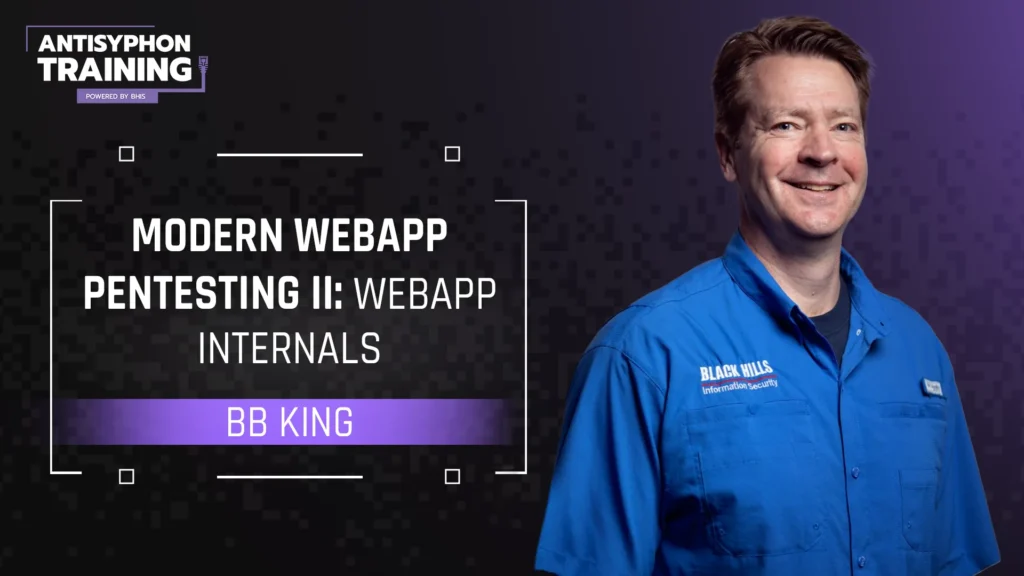Modern Webapp Pentesting II: Webapp Internals with BB King

Overview
- Course Length: 16 hours
- Support from expert instructors
- Includes a certificate of completion
- 12 months access to Cyber Range
Written as a followup to Modern Webapp Pentesting, this course builds on the fundamentals and gives you experience with how they apply to current problems in web applications.
A very hands-on course, the material is organized around key technologies and concepts like authentication and authorization, understanding in-browser defenses so you can devise ways to bypass them, and learning just enough about web development to see where real developers are likely to make mistakes or rely too much on unstated assumptions.
This course doesn’t worry about where a student falls on the imaginary scale of beginner to expert but instead focuses on finding and exploiting the kinds of issues found in real webapps today.
Key Takeaways
- A reliable methodology for testing today’s webapps
- Hands-on experience with the kinds of defects that modern webapps actually have
- Tips and Tricks for effective reporting so the issues you find can be fixed
Who Should Take This Course
- Motivated Beginners: the course begins with a dive into the protocols and standards that every webapp relies on. With this often overlooked anchor in the fundamentals, you will more easily see how abusing those things can lead to exploits
- Experienced Testers: with the shared understanding of the fundamental concepts, the middle section of the course moves on to show some of the more common ways that weaknesses appear in real applications. The middle section of the course is a lot of hands-on practice time, with lab options for all skill levels. If you know some exploits, but don’t know deeply how and why they work, this section will make you a more confident and flexible tester
- Everyone: the course wraps up with a deep dive into JSON Web Tokens (JWTs) and an introduction to Web Sockets. After investigating the fundamentals of how those things work, tied neatly to the anchors we started with, you will find a clear and repeatable way to quickly learn about unfamiliar technologies so that you won’t be caught short the next time you see something new for the first time
- If you already test webapps routinely, you may appreciate the focus on the fundamentals, an easy-to-follow testing methodology, and the time spent thinking about how best to report what you find so you’re more likely to drive improvements, earn that bug bounty, or get hired again for a future test
Audience Skill Level
- Motivated Beginners: the course begins with a brief review of protocols and tools so we have a shared mental framework to process the more advanced topics that come later
- Experienced Testers: the majority of the course addresses features and technologies that are not so much “advanced topics” that rely heavily on deep understanding of arcane topics as “newer things that nobody talks about attacking”
- If you test webapps exclusively, all day every day, you may still appreciate the time spent on focused practice, methodology, and reporting. Anyone else will also find some new things they can take back to work or bounty-hunting right away
What Each Student Should Bring
- Curiosity and tenacity
- A laptop with the features described above
- OR one with Docker pre-installed (the course does not include any Docker instruction, so do this only if you’re already comfortable troubleshooting your own Docker issues)
- At least 10GB available diskspace
- Current Firefox web browser
What Each Student Will Be Provided With
- Slide deck and links to all the material and tools needed with instructions
- Virtual machine with all the necessary tools and targets for the course
- Contact information for the instructor and a 6-week window of direct one-on-one access in case you have questions after the class is over
- Stable Internet access
- x86 architecture CPU clocked at 2 GHz or higher that is capable of nested virtualization
- (Apple Silicon is currently not supported)
- A computer with at least 8 GB of RAM. 16 GB is recommended
- VMWare Workstation or VMWare Fusion
- (VirtualBox and other VM software is not supported)
- Windows 10/11, MacOSX+, or a currently supported Linux Distribution
- Full Administrator/root access to your computer or laptop
There are no scheduled live dates for this course at this time.
On Demand Training
-
Train at your own pace with no set course schedule
-
Access to all course resources, including slides and VMs
-
Subject Matter Expert support through Discord
- Tips, tools, and techniques that can be applied immediately upon returning to work
- Strengthen your skills by solving challenges within the Antisyphon Cyber Range
- Become part of a community driven to educate and share knowledge
